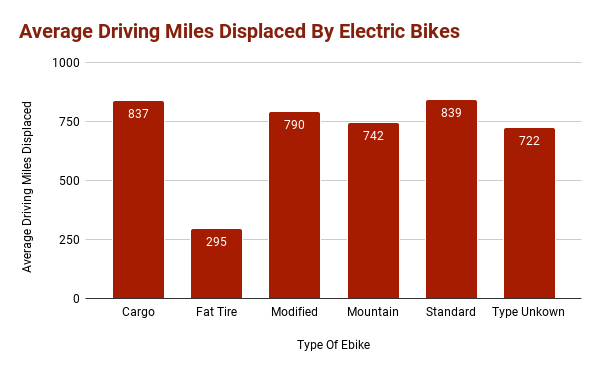Electric bikes can be a great solution for people looking for a highly energy efficient mode of transport.
Electric bikes are far more efficient than the vast majority of other transport options. Not only are ebikes more energy efficient than gas-powered cars or busses, but also other electric vehicles as well. This makes them highly desirable for people who want a cost effective vehicle that minimises the impact of their travel on the environment.
This guide is going to focus on the energy efficiency of ebikes, but you may want to take a look at our Beginner’s Guide to Electric Bikes if you want a more general overview.
There’s many factors to consider when evaluating the energy efficiency of a vehicle, so let’s start with some summarised pros and cons of electric bikes.
Electric Bike Efficiency Overview
Electric bikes are highly energy efficient, even when compared to other eco-friendly modes of transport.
Here’s some of the key pros and cons of ebikes in relation to their efficiency:
Pros:
- One of the most energy efficient modes of transport, even when compared to other electric vehicles (around 20 times more efficient than some of Tesla's flagship cars)
- Release far less CO2 emissions than cars (both gas and electric cars)
- The high efficiency of ebikes saves you money on the energy wasted by other modes of transport
Cons:
- Less places to charge/refuel than most other modes of transport
- Usually not as fast as other modes of transport
- Can be less safe than other modes of transport if they're not ridden carefully
When analysing the energy efficiency of a mode of transport, you usually compare the energy input to the energy output. For example, when evaluating the efficiency of a car you compare the amount of petrol you put in your tank to the amount of miles that this allows you to drive (miles per gallon) – this gives you a numeric value representing how efficiently your car converts petrol into energy.
To allow us to compare the efficiency of electric vehicles the same way that we do with petrol or diesel vehicles, the US Environmental Protection Agency (EPA) created a measure called MPGe (miles-per-gallon-electric). This measure the distance that an electric vehicle can travel on 33.7kWh of electricity. This means that if an electric vehicle can cover a distance of 50 miles on 33.7kWh of electricity, it has an MPGe of 50, and this is equivalent to a gas powered gar getting 50 miles to the gallon.
Using this measure of efficiency, an average electric car usually between 90 and 130 MPGe. When we we the same measure for the average ebike, they get around 2,000 MPGe! This shows the substantial difference in the conversion of energy to distance travelled, and it’s worth noting that that is roughly 20 times more efficient than some of Tesla’s flagship vehicles.
So, electric bikes are energy efficient, but what does this mean for the wider world?
How does the energy efficiency of bikes impact the wider planet?
The energy-efficiency of bikes is making them an increasingly popular mode of transport, and this is in turn reducing people’s reliance on cars, busses and trains.
Cars, busses and trains cause significant pollution, with 2022 Defra statistics showing that the average petrol car emits 170g of carbon dioxide per kilometre, with the average bus emitting 96g and the average national rail journey emitting 35g.
Looking at this chart, we can see that the average ebike owner displaces around 700 driving miles annually. When you combine this with the Defra statistics, this may prevent around 191,512 grams of carbon dioxide from being released into the atmosphere – that’s 191.1 kilograms of CO2, and that’s just one rider!
This demonstrates the substantial impact that switching to electric bikes can have on our environment.

Electric bikes are not only a good for the environment in terms of the gas miles that they displace, but also in terms of the reduction in manufacturing related emissions.
Most people are aware that cars produce CO2 emissions every mile that they drive, but less people consider the emissions produced during the manufacturing process. As you would imagine, the manufacturing process for ebikes releases far less CO2 thanks to their smaller size and relatively simple construction.
So, how do the emissions numbers compare exactly?
How efficient are ebikes in terms of CO2 emissions?
It probably goes without saying, but electric bikes are far more efficient than cars in terms of emissions, and that includes electric cars too.
Looking at this comparison of electric bike emissions versus electric car emissions, we can see that there is a significant difference between the two.
The manufacturing of a BMW i3 releases around 8,036 kg of CO2 emissions, which is a shocking 26 times greater than the 301 kg to manufacture a Como 4. This trend continues with CO2 emissions per mile, with the electric car producing 289 grams to the ebikes lowly 11 grams.
It’s safe to say that ebikes are for more energy efficient in terms of emissions, even when compared to other eco-friendly alternatives.

FAQs
Yes, electric bikes are significantly more energy efficient than electric cars. The U.S. Environmental Protection Agency (EPA) uses a measure called MPGe (miles per gallon equivalent) to compare the efficiency of different electric vehicles. Most electric cars average between 90–130 MPGe, but an electric bike averages around 2,000 MPGe. That makes ebikes about 20 times more efficient than some of Tesla’s flagship cars. The reason for this huge difference comes down to weight and design: ebikes are lightweight, require smaller batteries, and use far less energy to move compared to a 1.5-ton electric car. For riders looking for the most energy-efficient way to travel, electric bikes currently lead the pack.
The range of an electric bike depends on factors like battery size, terrain, and how much pedal assistance you use. On average, commuter ebikes can travel between 25 and 70 miles per charge, while high-capacity or dual-battery models can reach up to 100 miles or more. For example, a 500Wh battery typically provides around 30–50 miles, while a 1000Wh battery can easily double that distance. In terms of efficiency, the electricity used for one full charge is usually just a few pence, making it dramatically cheaper and cleaner than refuelling a petrol car or charging a large electric vehicle. This makes ebikes a highly practical solution for both daily commuting and leisure rides.
Absolutely. Electric bikes are not only energy-efficient but also cost-efficient over time. Charging an ebike costs only a few pence per full charge, compared to fueling a petrol car, which can cost £60–£100 per tank, or charging an electric car, which can cost several pounds per session. Maintenance is also much cheaper — ebikes don’t need oil changes, MOT tests, or complex repairs associated with cars. The lower upfront cost compared to electric cars, combined with minimal running costs, makes ebikes one of the most affordable ways to travel short and medium distances. For commuting, replacing just a few car journeys per week with an ebike can save hundreds of pounds per year while also reducing your carbon footprint.
Thanks for reading our article analysing the energy efficiency of electric bikes.
If you’re more interested in affordability, check out our article on Best Electric Bike Under £500.
If you prefer an off-road adventure, you may want to take a look at our article on the Best Fat Tire Electric Bike.
Feel free to leave a comment below if you have any thoughts or queries that you’d like us to take a look at – we’d be happy to help.





